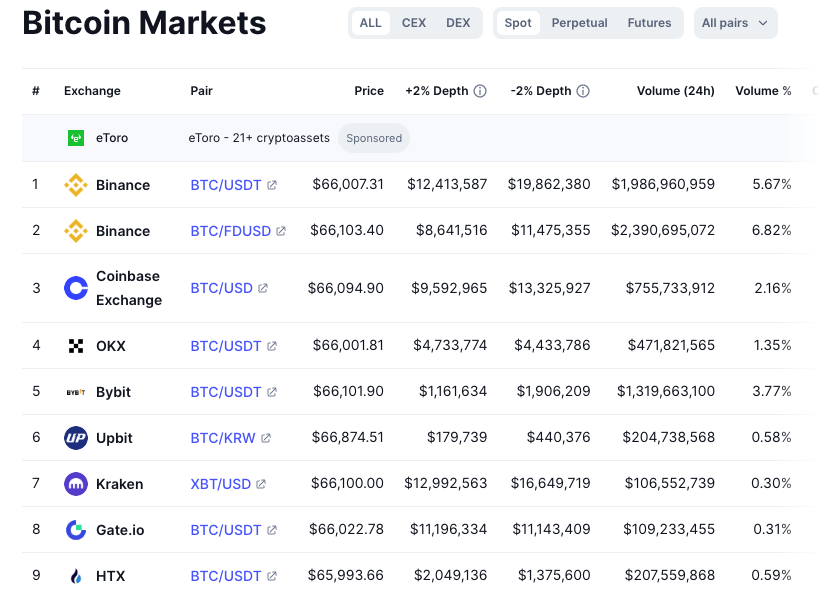

Key Takeaways
- Crypto arbitrage trading involves taking advantage of different prices on different exchanges. However, it’s very difficult to do successfully. Most opportunities disappear within seconds, and transaction costs can turn profits into losses.
- It’s recommended that beginner traders stay away from arbitrage trading and stick to long-term investing.
What is crypto arbitrage trading?
To understand how to do crypto arbitrage trading, let’s take a step back to understand arbitrage as a concept.
Different cryptocurrency exchanges have different levels of supply and demand for individual assets, which can lead to the same cryptocurrency being priced differently.
For example, let’s take a look at CoinMarketCap to see how Bitcoin is priced on different exchanges.

Crypto arbitrage involves taking advantage of these price discrepancies. That means buying Bitcoin on one exchange at a low price and selling it on another exchange at a higher price.
Crypto arbitrage requires traders to act quickly, as these price discrepancies usually only last for a short time.
Does crypto arbitrage really work?
Successfully making profits from crypto arbitrage trading can be very difficult due to the high amount of competition and the speed needed to successfully execute a profitable trade.
Due to the difficulties involved with profitable crypto arbitrage trading, many successful traders use bots that can automate this process for them (more on this later).
Is crypto arbitrage trading legal?
Yes. Arbitrage trading is legal in the United States and most other jurisdictions.
Example: Why is crypto arbitrage so difficult?
On paper, arbitrage sounds simple: just buy low and sell high. But in reality, it’s hard to execute. To better understand why, let’s take a look at an example.
Example: Crypto arbitrage trade
Let's say you spot Bitcoin trading at these prices and you decide to make an arbitrage trade.
- Kraken: $64,500
- Binance: $64,800
At first glance, it looks like you can easily make $300. Reality can make things messier. Let's look at how this process might look step-by-step.
Step 1: You buy 1 BTC on Kraken for $64,500.
- Trading fee (0.26%): $168
- Total cost: $64,668
Step 2: You initiate a withdrawal to transfer your BTC to Binance.
- Withdrawal fee: $15
- Wait time: 15-45 minutes for blockchain confirmations
Step 3: While you're waiting, the price on Binance drops to $64,650.
Step 4: You sell on Binance at $64,650.
- Trading fee (0.1%): $65
- You receive: $64,585
Final result:
- You spent: $64,668
- You received: $64,585
- Net loss: $83
As you can see, something that looks like an easy profit can turn into a loss.
It’s also possible that you may encounter the following issues:
- Network congestion causing delays
- Price slippage when executing large orders
- Exchanges freezing deposits or withdrawals
How to get started with crypto arbitrage trading
Let’s walk through a step-by-step process to get started with crypto arbitrage trading.
- Set Up Your Accounts: You should create a cryptocurrency exchange account on multiple exchanges, including major exchanges like Coinbase, Kraken, and Gemini as well as smaller exchanges (which often have bigger price discrepancies).
- Monitor Prices: To identify crypto arbitrage trading opportunities, you’ll need to continuously monitor prices between different exchanges. You can use tools like CoinMarketCap to look at how cryptocurrencies are priced on different exchanges. You can also use crypto arbitrage scanners to automatically detect arbitrage opportunities (more on this later in the article).
- Execute Trades: Execute a trade quickly so that you can make a profit before your arbitrage opportunities disappear!
What are the types of arbitrage trading?
- Cross-exchange arbitrage: This is the simplest form of arbitrage. It involves buying cryptocurrency on one exchange, and selling it on another.
- Spatial arbitrage: Spatial arbitrage takes advantage of the different prices of cryptocurrencies in different geographical locations. For example, you can buy BTC on a US exchange and sell it on a Canadian exchange. Spatial arbitrage may be difficult to execute due to regulatory restrictions between countries.
- Triangular arbitrage: This strategy takes advantage of the price differences between three different trading pairs. For instance, you may trade Bitcoin for Ethereum, Ethereum for Litecoin, and Litecoin back to Bitcoin for a profit.
Automated trading in crypto arbitrage
Many crypto arbitrage traders rely on automated bots to carry out trades for them. Here are a few ways automated trading tools can help you:
- Price monitoring: Bots can take out the manual work of continuously tracking prices across crypto exchanges.
- Automatic trades: Automatically buy and sell cryptocurrencies when price discrepancies are detected.
- Speed: Bots operate faster than human traders, making them essential in high-speed arbitrage trading.
Some advanced traders say that publicly available bots are not profitable because they cannot execute trades faster than institutional traders. As a result, many experienced traders choose to make their own custom trading bots.
Best crypto arbitrage scanners
The following tools can make it easy to scan price discrepancies and find arbitrage trading opportunities:
CoinMarketCap: When you look up a cryptocurrency on CoinMarketCap, you’ll see its current price on multiple exchanges. While this option is completely free, it does take more manual work than some of the other alternatives listed.
ArbitrageScanner: The ArbitrageScanner sources data from 15+ exchanges and 5+ blockchains, and gives you alerts when there is an arbitrage opportunity. ArbitrageScanner requires a paid subscription, and the cheapest plan currently costs $99 a month.
Cryptohopper: Cryptohopper offers AI-powered crypto trading bots, and can execute arbitrage trading strategies! Cryptohopper is available on a paid plan for about $24 a month.
Should I do arbitrage as a crypto beginner?
If you’re new to crypto, it’s recommended to stay away from crypto arbitrage trading. Here are some steps you might want to consider instead:
- Dollar-cost averaging into cryptocurrencies with long-term value
- Learning how to analyze a cryptocurrency’s utility and tokenomics
- Using staking for passive income
Pros and cons of crypto arbitrage trading
Let’s walk through the pros and cons of crypto arbitrage trading.
Pros:
- Profit Potential: Arbitrage trading can lead to easy profits, especially if you’re using automated trading.
- Short-Term: Arbitrage trading typically involves buying and selling cryptocurrencies in a short period of time, meaning you eliminate the risk of your cryptocurrency losing value in the long term.
Cons:
- High Competition: Successfully executing an arbitrage trade can be difficult due to the high number of traders looking to capitalize on the same opportunities.
- Transaction Costs: Fees and transaction times can reduce profit margins, and transaction delays can cancel out gains.
- Complexity: Arbitrage trading is an advanced strategy that requires time, effort, and knowledge of price tools. If you’re new to cryptocurrency, it’s a good idea to stay away from arbitrage trading for the time being.
Is crypto arbitrage trading taxable?
Just like other cryptocurrency transactions, crypto arbitrage trading is subject to tax.
When you dispose of crypto, whether you sell it or trade it for another cryptocurrency, you incur capital gains tax. That means profits from arbitrage trading are usually taxed as capital gains.
If you're actively arbitrage trading, you could be generating dozens or even hundreds of taxable events per month. That’s why many traders use crypto tax software like CoinLedger to track their transactions and generate complete crypto tax forms in minutes.
In conclusion
While it may be hard to successfully execute a crypto arbitrage trade, price discrepancies between exchanges do present an opportunity for quick profit. If you’re getting started with arbitrage trading, it’s important to do your research, find the right tools, and understand the risks involved.
Frequently asked questions
- Is crypto arbitrage trading profitable?
Crypto arbitrage trading can be profitable, but difficult due to the high amount of competition involved.
- Is crypto arbitrage illegal?
Crypto arbitrage trading through regulated exchanges is fully legal.
- Is crypto arbitrage still possible?
Making profits off of crypto arbitrage as a solo trader is very difficult. Many successful crypto arbitrage traders use automated tools to make a profit.
- Can you make a living off crypto arbitrage?
While crypto arbitrage trading can be a great way to supplement your income, it should not be relied upon as your primary source of income due to the risks involved.
How we reviewed this article
All CoinLedger articles go through a rigorous review process before publication. Learn more about the CoinLedger Editorial Process.

CoinLedger has strict sourcing guidelines for our content. Our content is based on direct interviews with tax experts, guidance from tax agencies, and articles from reputable news outlets.






























%20(1).png)





.png)
















